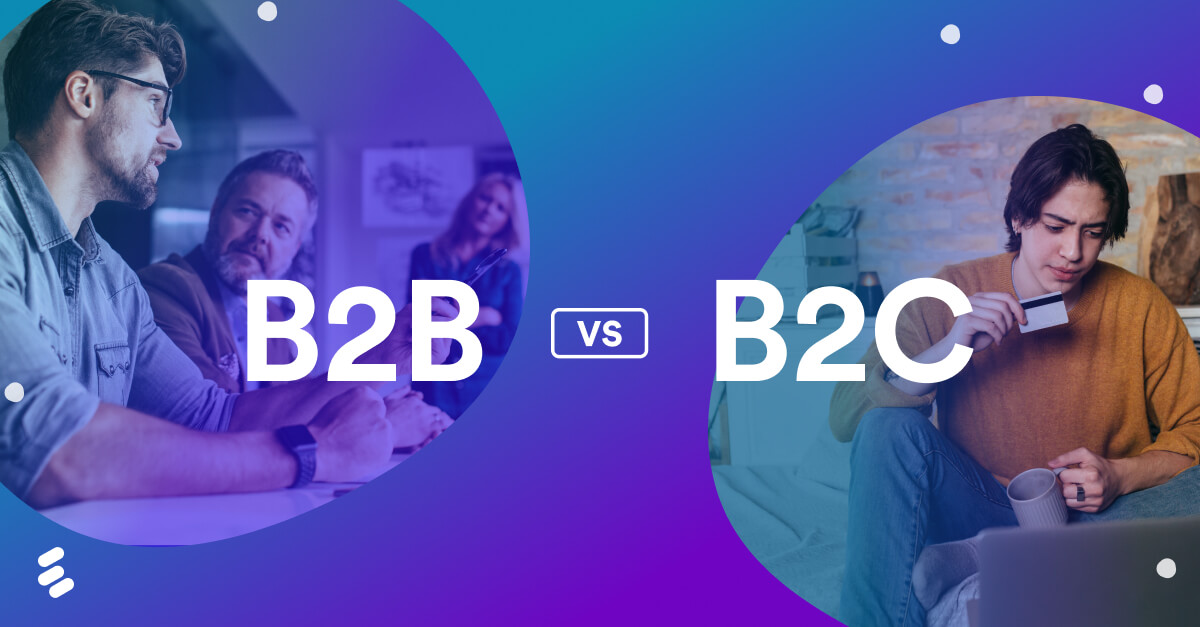5 key differences in B2B vs. B2C marketing
October 25, 2021

Managing the marketing function of an accounting software company compared with a clothing store requires very different approaches. Why? Because the way your customers view your brand and interact with your website is very different in both scenarios.
Understanding the marketing funnel, target audiences, and optimal strategies and tactics for B2B and B2C businesses is critical to running successful campaigns and driving revenue.
B2B vs. B2C marketing
B2B stands for “business to business.” It refers to any company that sells its products and services to another company. Examples of B2B scenarios include business software, marketing agencies, and consultants.
B2C stands for “business to customer” and refers to any product or service that is sold to individuals. It usually refers to consumer goods such as fashion, food, personal technology, etc.
How your customers buy your products and interact with your company varies a lot depending on whether you’re operating a B2B or a B2C model. These differences are the jumping off point for building an effective marketing strategy.
5 differences between B2B and B2C marketing
From how you research your target audiences to the type of messaging you use in digital ads, there are some critical differences between B2B and B2C marketing.
1. The buying cycle
For B2C businesses, the buying cycle for your customers is often very short, especially for less expensive consumer goods. A customer can go from hearing of your brand for the first time to purchasing from you almost instantaneously. You’re also much more likely to have a large proportion of one-off buyers.
With B2B, on the other hand, the buying process can be much longer. B2B products and services are often much more expensive. Since your customer will be buying for their company as opposed to themselves, they will be much more focused on researching and evaluating your solution to ensure it’s the right fit for their company’s objectives. They may also have to go through a lot of internal approval processes before you can finalize the sale.
However, while the buying process is typically longer, it can be much easier to establish long-term, ongoing relationships with B2B buyers.
2. Customer priorities
Buying for yourself versus buying on behalf of your company presents very different priorities and criteria.
When purchasing B2C items, consumers are more likely to consider their budget and personal preferences before making a decision.
When buying on behalf of their business, B2B buyers will be more concerned with how your company can help them produce results and provide return on investment.
3. Marketing tactics and strategy
Once you’ve taken the buying cycle and customer priorities into account, it becomes clear that you’ll need to approach your marketing strategy in a very different way.
For example, B2B marketers often leverage content marketing to encourage movement through the sales pipeline. The content addresses customer problems and questions at every stage of the funnel, from discovery and research right through to purchase. They’ll use eBooks, webinars, case studies, and more over a long period of time to nurture the relationship.
On the other hand, B2C companies are often targeting customers already at the decision phase of buying. They can expect instant sales and so they’ll often leverage pay-per-click marketing and similar strategies.
4. Marketing channels and messaging
Where you choose to market and the type of messaging you craft for your campaigns can vary greatly between B2B and B2C. The context of your online presence and targeted advertising plays a critical role in the success of your campaigns.
Social media is a great example of how marketing channels and messaging differs between B2B and B2C marketing. B2B marketers will place a great deal of emphasis on LinkedIn since it’s a professional network. When people are browsing LinkedIn, they’re already in a “business” mindset and will be more receptive to your messaging. Conversely, B2C marketers will see much higher success through personal social channels like Instagram.
The tone and messaging of your campaigns will be different too. Many B2B brands opt for a more formal tone and their messaging will focus on business benefits. On the other hand, B2C companies often use more informal language and a greater opportunity to personalize their ads and messaging.
5. Campaign costs
In B2B situations, it’s not unusual to need many decision makers on board to finalize a sale. So the marketing team may need to spend a lot more money in order to target multiple people and teams. In B2C, however, customers can often make snap purchase decisions, and precisely targeted ads can earn a much lower cost per click.
The importance of data in both B2C and B2B marketing
Regardless of whether you’re operating under a B2C or a B2B marketing model, making data-driven decisions can vastly improve the success and ROI of your campaigns. Customer data platforms ensure all your sales and marketing platforms talk to each other so you can create highly targeted campaigns for the right prospects at the right time.
With Lytics, our machine learning decision engine does all the work for you, learning to interpret the needs and preferences of your target audiences and delivering marketing campaigns accordingly. Try it out to see how Lytics can make a difference to your marketing goals today.

